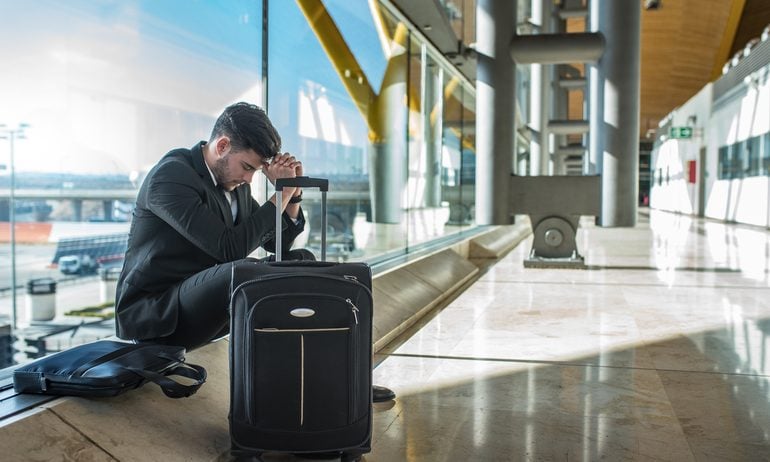What Does Travel Insurance Cover?
Travel insurance may not be able to cover you in certain situations, like adventure sports or foreseeable weather.

Many, or all, of the products featured on this page are from our advertising partners who compensate us when you take certain actions on our website or click to take an action on their website. However, this does not influence our evaluations. Our opinions are our own. Here is a list of our partners and here's how we make money.
If something goes wrong during a trip, your savings account could take a serious hit if you don’t have travel insurance. Flight cancellations, lost baggage or an accident can throw a wrench into your carefully made plans and cost a lot to rectify.
On the other hand, knowing that your trip is protected can help put your mind at ease before, during and after a vacation. But exactly what does travel insurance cover? Let’s find out.
What is covered by travel insurance
Most plans typically cover a range of trip protections, including accidental death and dismemberment, baggage delay or loss, emergency medical coverage and evacuation, trip cancellation, delay or interruption and more. Here's a closer look at each one.
Accidental death and dismemberment
Accidental death and dismemberment insurance provides coverage for death or losing a limb or eyesight as a result of an accident. Note that death from natural causes, illness or by suicide isn’t covered, so it’s not the same thing as a life insurance policy.
Baggage delay
Baggage delay insurance reimburses the cost of essentials, such as clothes, toiletries or a phone charger, that you may need to purchase if your bag is delayed. Your baggage must be delayed over a certain number of hours to receive coverage — typically the range is from six to 24 hours, depending on the policy.
Baggage loss
Insurance for baggage loss reimburses the cost of your suitcase and belongings should a checked bag become lost, stolen or damaged during a covered trip.
Emergency medical evacuation and repatriation
This benefit covers the cost associated with medical evacuation if you have a medical emergency and you can’t be treated at the facility closest to you. It will cover transport costs to another hospital or your home country, if necessary, and also includes transportation of remains.
Missed connection
A missed connection benefit covers extra expenses if a common carrier delay causes you to miss an organized tour or a cruise, for example, and you need to pay extra to catch up to it at the next port of call.
Reinstate frequent traveler awards
If you paid for a trip with airline miles or hotel points and it is subsequently canceled, this benefit will cover any fees required to redeposit your rewards back to your frequent traveler account.
Trip cancellation
Trip cancellation insurance reimburses you for prepaid nonrefundable costs if you must cancel a trip for a covered reason. Reasons that are typically covered include:
Sickness or death of a family member.
Financial insolvency.
Natural disaster.
Airline strike.
Inclement weather.
Jury duty.
Military duty.
Stolen passport or visa.
Loss of employment.
Trip delay
Trip delay covers costs associated with transportation, meals or lodging should your common carrier be delayed, as well as reimbursement of any prepaid, nonrefundable expenses. Trip delay coverage takes effect after a specified period of time depending on the policy, but typically ranges from five to 12 hours.
» Learn more: What you need to know about Chase’s trip delay insurance
Trip interruption
Trip interruption insurance reimburses you for unused, nonrefundable costs in the event you must cut the trip short and return home for a covered reason, including a family member’s sickness or death, terrorism, inclement weather or a natural disaster, among others.
Extras you can add to a travel insurance policy
Travel insurance plans usually don’t include coverage for every possible thing that can go wrong, but you can add optional extras to your policy for an upcharge. Check to see if your plan has the following types of coverage, and if you think you need it, you can add it in or buy a more inclusive policy.
Cancel For Any Reason
If you change your mind and decide not to go on a trip you’ve booked, you typically can’t get reimbursed for prepaid, nonrefundable expenses — unless you purchase a cancel for any reason policy separately. Depending on the policy, you usually get a portion of your prepaid expenses back (typically 50% to 75%), but you must purchase the policy within 10 to 21 days of initial payment. Note that cancel for any reason isn’t the same as trip cancellation listed above.
Rental car collision damage waiver
If your rental car is damaged or stolen, rental car insurance will protect you from having to pay for the damage or theft. Many credit cards, such as the Chase Sapphire Preferred® Card or the Capital One Venture X Rewards Credit Card, offer rental car collision damage insurance, so check whether the cards you hold have this benefit before adding it to a policy.
Pre-existing conditions
If you need coverage for a pre-existing medical condition, you must purchase a policy within the time specified by the insurance provider to be eligible for a pre-existing conditions waiver (usually ten to 21 days). Make sure that the coverage amount you enter is equal to all prepaid, nonrefundable costs for your trip.
» Learn more: The best travel insurance companies right now
Quarantine accommodations
This coverage is often part of trip delay insurance, but some providers include it and some don’t. For example, the Safe Travels Voyager plan offered by Trawick International covers lodging expenses in case you get sick with COVID-19 and have to quarantine abroad before flying home safely.
What does travel insurance not cover?
Travel insurance offers coverage for many situations, but not all. Some scenarios aren’t covered by a travel policy, including:
A named storm: Most travel plans protect you from hassles stemming from inclement weather. However, a policy needs to be purchased before a tropical storm or weather event is named. If you purchase coverage after a natural disaster has begun, it won’t be covered.
Activities performed under the influence: Drug and alcohol use are a notable exception to most travel policies. If you fall off an ATV because you drank a few alcoholic beverages or took drugs before operating a vehicle, you’re no longer covered.
Extreme sports: Some high-risk sports, such as bungee jumping, scuba diving or rock climbing, aren’t covered by a comprehensive travel insurance plan. However, you can buy a separate policy for the specific adrenaline activities you’re planning to do on your vacation from World Nomads, for example.
Fear of travel because of a pandemic or another reason: This is something that would be covered under a “cancel for any reason” add-on, but a general travel policy won’t cover fear of travel.
Medical tourism: Seeking dental work in Mexico or a hair transplant in Turkey? Keep in mind that your medical expenses for elective procedures aren’t covered by a plan with emergency medical coverage.
Pregnancy: If you want to cancel a trip because you’re pregnant, you can do so only if you purchased the plan before you became pregnant. Otherwise, it’s not a covered reason. Additionally, medical costs incurred while on a trip during pregnancy might or might not be covered (check with your insurance provider).
» Learn more: What to know before you buy travel insurance
How to pick the right policy for your trip
The length of trip, your age and the destination all factor into how much a policy will cost. The coverage types and their limits also influence the price tag.
Types of coverage and limits
Take a look at the terms of each policy and determine the type of coverage you need the most. Compare the coverage details and limits with the cost. If you hold a travel credit card, familiarize yourself with its benefits as some of the trip protections might be redundant.
Single trip vs. annual plan
For frequent travelers, an annual plan offers the most bang for your buck — it costs less money versus purchasing insurance for multiple single trips. An annual policy covers long international trips as well as short domestic trips in between, so you can have peace of mind all year long. But everything isn’t always included in a multi-trip plan, the coverage limits are lower and you may not be covered for pre-existing conditions.
Individual vs. family
When shopping for a quote, include everyone traveling in your party and their ages before you submit the trip details. Note that some insurance providers include free coverage for children 21 and younger if a parent is the primary policyholder.
» Learn more: 10 best travel insurance companies
If you want to understand travel insurance coverage
Because coverage varies among the different insurance providers and policies, make sure to read over the policy terms carefully, especially if you’re looking for a specific type or amount of coverage.
If you’re still not sure whether a specific event or activity would be covered, call the insurance company and chat with a customer service representative. It’s better to be aware of what’s covered and what isn’t before you need to (but hopefully don’t have to) file a claim.
For Capital One products listed on this page, some of the benefits may be provided by Visa® or Mastercard® and may vary by product. See the respective Guide to Benefits for details, as terms and exclusions apply.
How to maximize your rewards
You want a travel credit card that prioritizes what’s important to you. Here are some of the best travel credit cards of 2025:
Flexibility, point transfers and a large bonus: Chase Sapphire Preferred® Card
No annual fee: Wells Fargo Autograph® Card
Flat-rate travel rewards: Capital One Venture Rewards Credit Card
Bonus travel rewards and high-end perks: Chase Sapphire Reserve®
Luxury perks: The Platinum Card® from American Express
Business travelers: Ink Business Preferred® Credit Card
1x-8x
Points100,000 Points + $500 Travel Credit
Points1x-5x
Points75,000
Points1x-2x
Points50,000
Points



